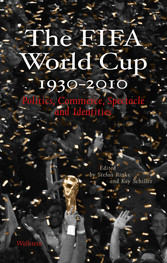Suchen und Finden
The FIFA World Cup 1930 - 2010 - Politics, Commerce, Spectacle and Identities
Content
As Brazil 2014 will yet again show, the FIFA World Cup is a mega-event followed by billions of spectators around the globe. This volume is the first scholarly attempt to capture the history of the FIFA World Cup in its entirety. From the first World Cup in 1930 to the one in 2010 the tournament has exerted strong influences and acted as an important indicator of political, economic, social and cultural developments. In bringing together contributions by international experts from history, cultural studies, sociology and politics this volume explores some crucial issues linked to the World Cup: from the political exploitation of the tournament for domestic purposes to its economic ramifications for the host nation and beyond; from its role for national identity and national self-representation to its potential to realize transnational modes of identity and interdependence; from its role as a global media event to its impact on the commercialization of football on the national and transnational stage.
Zum Inhalt
Auch bei der kommenden Fußballweltmeisterschaft in Brasilien werden Milliarden Zuschauer überall auf der Welt das Ereignis verfolgen: Der FIFA-World Cup ist ein Megaevent. Doch seine Bedeutung geht weit über das singuläre Ereignis hinaus: Seit der ersten Austragung im Jahr 1930 war das Turnier ein wichtiger Indikator für politische, soziale und kulturelle Entwicklungen. Die behandelten Themenkomplexe von Experten aus aller Welt - überwiegend Historiker, Soziologen und Kulturwissenschaftler - reichen von politischem Missbrauch des Turniers für innenpolitische Zwecke über wirtschaftliche Faktoren, nationale Identitäten bzw. ihre Selbstrepräsentationen bis hin zu der Entwicklung eines medialen Großereignisses.
The Editors
Stefan Rinke, Professor of Latin American History at Freie Universität Berlin, Einstein Research Fellow 2013-2015, author of many publications on Latin American history and football, including (ed. with Christina Peters) Global Play: Football between Region, Nation and the World in Latin American, African, and European History (2014).
Kay Schiller, Reader in Modern European History at the University of Durham, co-author of The 1972 Munich Olympics and the Making of Modern Germany (2010), author of WM 74. Als der Fußball modern wurde (2014) and of books and articles on modern German cultural and sports history.
Die Herausgeber
Stefan Rinke, geb. 1965, ist Professor für lateinamerikanische Geschichte an der Freien Universität Berlin. Derzeit arbeitet er an einer Monographie über den Einfluss des Ersten Weltkriegs auf die Herausbildung eines globalen Bewusstseins in Lateinamerika.
Kay Schiller, geb. 1962, lehrt Modern European History an der Durham University, Großbritannien.
Alle Preise verstehen sich inklusive der gesetzlichen MwSt.









